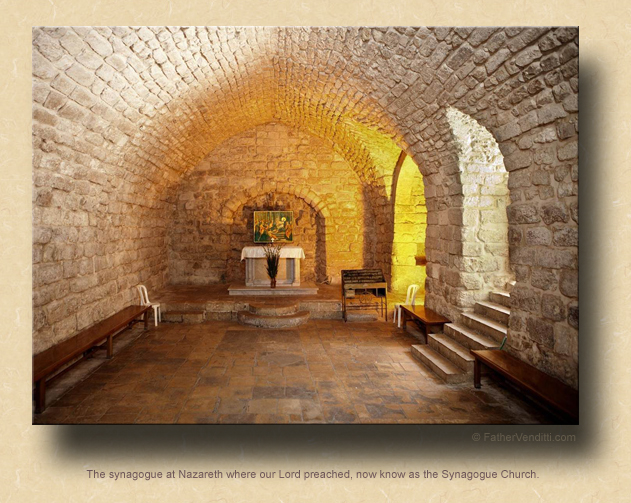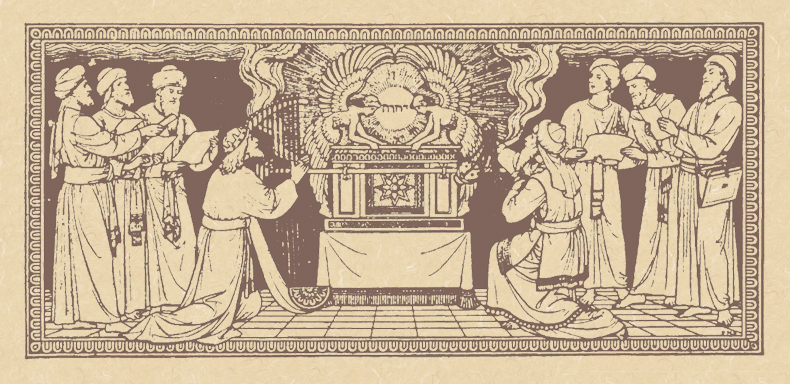How the "Social Gospel" Can Keep Us Out of Heaven.
The Twentieth Friday of Ordinary Time; the Memorial of Saint Louis; or, the Memorial of Saint Joseph Calasanz, Priest.*
Lessons from the primary feria, according to the ordinary form of the Roman Rite:
• Ruth 1: 1, 3-6, 14-16, 22.
• Psalm 146: 5-10.
• Matthew 22: 34-40.
|
If a Mass for the memorial of St. Louis is taken, lessons from the proper:
• Isaiah 58: 6-11.
• Psalm 112: 1-9.
• Matthew 22: 34-40.
…or, any lessons from the common of Holy Men & Women for One Saint.
|
|
If a Mass for the memorial of St. Joseph is taken, lessons from the proper:
• I Corinthians 12: 31—13: 13.
[or, I Corinthians 13: 4-13.]
• Psalm 34: 2-11.
• Matthew 18: 1-5.
…or, any lessons from the common of Holy Men & Women for Educators; or, the common of Pastors for One Pastor.
|
The Third Class Feast of Saint Louis, Confessor.
First & third lessons from the proper, Gradual from the common "Os Justi…" of a Confessor not a Bishop, according to the extraordinary form of the Roman Rite:
• Wisdom 10: 10-14.
• Psalm 91: 13-14, 3.
• Luke 19: 12-26.
The Eleventh Friday after Pentecost; the Feast of the Return of the Relics of the Holy Apostle Barthomew; and, the Feast of the Holy Apostle Titus.
First & third lessons from the pentecostarion, second & fourth from the menaion for the Apostle Titus, according to the Ruthenian recension of the Byzantine Rite:
• II Corinthians 7: 10-18.
• Titus 1: 1-4; 2: 15—3: 3, 12-13, 15.
• Mark 2: 18-22.
• Matthew 5: 14-19.
FatherVenditti.com
|
9:13 AM 8/25/2017 —

Today’s Gospel lesson begins with a circumstance which may seem strange to you: the Pharisees feeling a little bit of encouragement over the fact that our Lord had sparred with the Sadducees over the question of the resurrection of the dead, and pretty much made mincemeat of them in the debate, the incident occurring in your Bible just before today’s lesson. A long time ago I had explained how there were two distinct classes of rabbis in our Lord's time: the traditionalist wing of the rabbinical class called the Sadducees, and a more progressive group which is first evidenced in the Books of Maccabees, just sixty years or so before the time of our Lord, called the Pharisees.
The Pharisees were radical in a number of ways, but two elements of their theology stand out: they preached a resurrection from the dead, which the Sadducees rejected; but, more to the point, they instituted the synagogue service which enabled the Jewish people to gather for prayer on the Sabbath without making the journey to the Temple in Jerusalem. But synagogue worship was very different from temple worship. The service in the temple was a sacrifice: an animal, usually a lamb, was slaughtered and burned on the altar. The synagogue service was not a sacrifice: it consisted of reading from, then commenting on, the Holy Scriptures; and, this really angered the Sadducees. The Sadducees viewed the synagogue service in much the same way that you and I would view a Protestant service: they read from and talk about the Bible, but there's no sacrifice, so it's not real in a sacramental sense. That's exactly how the Sadducees viewed the synagogue.
We often like to view the Pharisees as our Lord's primary nemesis, because they're always challenging Him about things He's said or things He's done; but, in reality, He and His disciples all came out of the Pharisaical tradition. Jesus preached a resurrection from the dead—although the resurrection He preached was to be His own—and He and His disciples all worshiped in the synagogue every single Sabbath; and, sometimes I don't wonder that the reason the Holy Gospels show our Lord clashing with the Pharisees so much more frequently than with the Sadducees is because the Pharisees know that our Lord is basically on their side, and don't understand why He continues to do things of which they don't approve, whereas the Sadducees would consider our Lord a lost cause and not worth engaging.
The synagogue itself service was very orderly and regimented. It began with the Shema prayer from Deuteronomy 6: 4: שְׁמַע, יִשְׂרָאֵל: יְהוָה אֱלֹהֵינוּ, יְהוָה אֶחָד. (Sh'ma Yis'ra'eil! Adonai Eloheinu. Adonai echad): “Hear, O Israel! The Lord is God. The Lord is One.” And the Shema prayer is, in fact, the first of the two Great Commandments referenced by our Lord today. It's what a devout Jew will tack on the door-post of his home. The second commandment is found in the Book of Leviticus: “Do not seek revenge, or bear a grudge for wrong done to thee by thy fellow-citizens; thou shalt love thy neighbour as thyself; thy Lord is his” (19: 18 Knox).  What is new in the teaching of Jesus is the fact the He puts these two commandments together and puts them in a certain order. This one is first, and the other is second. That's the point that Jesus is making. And when you think about it, you can see how important a point that is for us in our time. What is new in the teaching of Jesus is the fact the He puts these two commandments together and puts them in a certain order. This one is first, and the other is second. That's the point that Jesus is making. And when you think about it, you can see how important a point that is for us in our time.
There are too many today who seek to assuage a guilty conscience by having recourse to the Corporal Works of Mercy. That's not to say that they aren't important, or that they don't cancel a multitude of sins, because they do; and, we know our Holy Father is encouraging us to rededicate ourselves to the care of the poor and the needy. I'm not contradicting him, but only pointing out the danger: the danger of reinventing the Gospel of Jesus Christ, seeing it as nothing more than a blueprint for social justice, and Christian living as simply a matter of feeding the hungry and sheltering the homeless, having little, if anything, to do with how we live our private lives. This is rooted in the inability of modern man to acknowledge a truth outside of himself, which results in him professing a religion of which he knows little, making it up for himself as he goes along. Christians who think this way are really the Sadducees of our time, who, like their counterparts of the first century, think that they have it all figured out. And it takes the Divine wisdom of our Lord to put it all back in perspective so simply: yes, we must do good for others;— that is a part of the Gospel message—but, we must do it for the right reason. It is not our good works themselves that please God, but the fact that they are done for Him, in conjunction with an otherwise holy life; just as the Psalmist says, "…here, O God, is my sacrifice, a broken spirit; a heart that is humbled and contrite thou, O God, wilt never disdain" (51: 19 Knox).
Practically speaking, we have to look at our own lives. How many of us think that we are all right before God because of all the wonderful things we've done for our fellow man or even for the Church, when the real question should be: "When was the last time I went to confession? When did I last really prepare myself for Holy Communion? When did I do something for God that wasn't rooted in the social gospel but rather in the moral gospel?" God want's our good works only if they bring us closer to Him and motivate us to live holy and moral lives; otherwise they are worthless to Him. All that is important to God is that we are His: heart, mind, and soul.
As we offer up together the Sacrifice of the Lord's Body and Blood, let us remember that, if we can't offer ourselves, then we have nothing of value to offer.

* The only King of France to be canonized a saint, Louis IX (1214-1270) was a model ruler and the father of eleven children. He was a Fransican tertiary who cared especially for lepers, and built Sainte Chapelle in Paris as a reliquary for the crown of thorns, probably the most beautiful Gothic church in the world. He died of the plague near Tunis while participating in the Second Crusade, and is recognized as the patron of masons and sculptors.
Born in Aragon in Spain, Joseph Calasanz (1557-1648) founded, in 1617, the Clercs Regular of Religous Schools, known today a9:26 PM 8/24/2018s the Piarists, dedicated to the education of poor children. Today, they number around 1,375. During his lifetime, he suffered many trials, mostly from within the Church herself, which was fond of accusing him of all sorts of moral atrocities, even having his institute suppressed for a time. Officially, he is regarded as the patron of all Christian schools dedicated to the children of the poor, but he should be recognized as the patron of all priests who have been unjustly accused.
|

